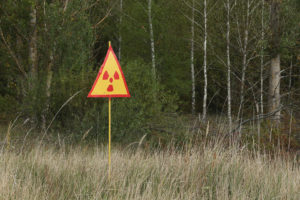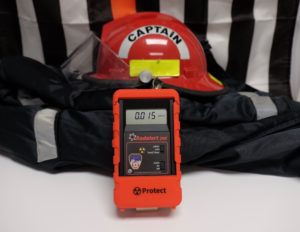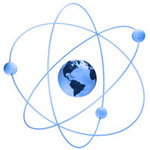Inspector Geiger Counter Measuring Radioactivity on a Firefighters Discarded Clothing
Time flies by. It’s already been 32 years since the Spring day in April when things went terribly wrong in a place called Chernobyl. I was a young man at the time. My first company made radiation detectors and did some solar energy projects and research. The winds shifted in Washington DC and solar had grown out of favor. Today the winds have shifted in the Ukraine and the radioactive Chernobyl complex will likely become the site of a very large solar energy project. People won’t be living there, but perhaps some AI and robotics will be applied to managing the farm that collects photons to power cities without the use of the fissionable materials that saturate the landscape.
I had decided to start a new company developing some medical electronics products, but got side tracked by the Chernobyl disaster. My experience in radiation detection and emergency response drew me back into radiation detection and, eventually, a trip to Belarus, where a large amount of the fallout from Chernobyl was carried by the winds. That’s what happens with fallout. It goes wherever the winds blow. When it rains it rains fallout and that ends up on the earth. From there it gets distributed into plants and animals. Some people I met there were quoting Revelations in the Bible – “The name of the star is Wormwood. A third of the waters became wormwood, and many people died from the water, because it had been made bitter.” It turns out Chernobyl means Wormwood in Russian. To the affected people this had clearly been a “Biblical Event.”

The human impact from Chernobyl will be long debated. The secrecy of the pre glasnost Soviet Empire and the lack of monitoring gear deprived the affected populations of meaningful data. The initial firefighters were affected by the non stochastic or “deterministic” effects of radiation. They became ill, lost hair, some died. If we had more data we would arguably find that some portion of the population were affected by stochastic effects. Cancer is one type of effect produced by radiation exposure, and there is a latency period that can be years or decades. As Einstein noted, time is relative and 32 years is just a blink of the eyes relative to the half life of the materials spewed out by explosive meltdown that blew the top off of the reactor building.
I’ve always had a thing for firefighters, since I was a young boy. Today I’m grateful that I am able to work with firefighters in the US and abroad to equip them with radiation protection gear. I think the firefighters at Chernobyl and Fukushima Daiichi were likely under the influence of what some describe as the “Valor Effect,” a mindset that often puts other lives above their own. Think of the FDNY firefighters who were climbing up the twin towers as they were coming down. Putting out fires is dangerous. Nuclear meltdowns are another animal. It’s hard to imagine a fire breathing dragon or other creature, mythological or not, who could evoke more fear than a reactor melting and breathing burning plutonium, cesium and strontium. I met a man who responded and looked into that dragon and I looked into his eyes. I found myself thinking that those eyes had seen things that humans had not evolved or been conditioned to see or deal with. It was really a beyond words experience.

Thirty two years later I find myself focused entirely on radiation detection. The medical product prototypes I was working on when the reactor blew are gathering dust.
Fortunately, I was able to respond and provide some help to communities when the reactors melted at Fukushima Daiichi on another beautiful Spring day. Again firefighters were on the front lines.
Because I care about people and the Earth and firefighters I keep hoping humanity will learn to avoid these types of events that turn Spring days into sorrowful seasons that bring loss of life and health to people, and displacement and stress. As nuclear power deployment moves into more closed societies and developing nations, safeguards are needed to ensure quality and safety for communities. Or we have not learned important lessons and the people who suffered at Chernobyl – well, their lost lives have less meaning over time.
Chernobyl had a deep lasting personal effect on me. The course of my life changed. Every year I find myself reflecting on the people I met, the stories, the stress and uncertainty the communities faced and still face, and the courage and valor of those firefighters. I remember.
